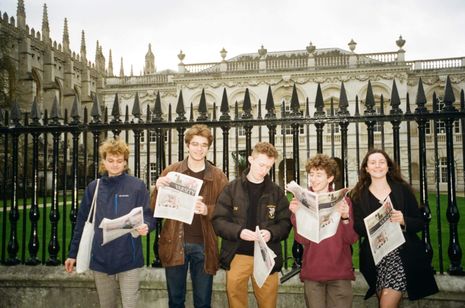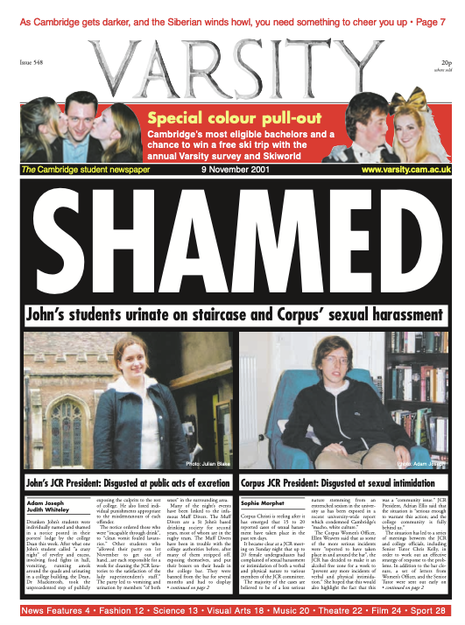Sum up student journalism? A middle finger to authority
Editing Varsity showed me what being a student journo is all about

Some people knew they wanted to get involved in student journalism before they left their mother’s womb. They ran their school papers and magazines and were reading Varsity during lunchtimes in sixth form. I wasn’t one of them. While my two closest friends joined “media club” in our first year of secondary school, I preferred to spend my afternoon break playing football. A baffling idea to reflect on now given my current abilities in the sport.
Naturally when I started university it was the theatre-scene that beckoned. Unfortunately I soon discovered I wasn’t as funny as my mum had led me to believe and I was quickly rejected after auditioning for a Footlights production in my first term (I put this down to it being over Zoom).
But unenthusiastic about my degree and keen to meet new people after a first-year mired by Covid, I joined Varsity’s newsdesk as a junior editor when the curtain of pandemic Cambridge was raised in Michaelmas 2021.
I was expecting the kind of journalism presented in the 1976 classic film, All the President’s Men, which details how two young reporters exposed Richard Nixon’s corruption during the Watergate scandal. But what I found when I started was something very different.
We were asked to perfect the art of ‘trawling’: harvesting the social media accounts of the University to find stories
We were asked to perfect the art of “trawling”: harvesting the social media accounts of the University and its colleges to find stories. I’ll never forget that ghastly word. It would be hard to call these stories since they tended to be announcements or simply college propaganda typically found in a leaflet sent to ageing alumni rather than a newspaper, least of all one run by students. One of the first stories I worked on was about a new program where academics would help teach pupils from struggling state schools. My headline “dons in the classroom” was swiftly shot down after I was told it didn’t meet “Varsity’s style”.

So what was Varsity’s style? If the ethos when I joined was anything to go by it was this: be boring, stay quiet and don’t get into trouble.
This felt like the opposite of the swashbuckling reportage I had seen in the movies. Where was the late-night rendezvous in the car park? The dramatic phone call cigarette in hand? The aggressive front page scoop? “Student newspapers are best when they’re anarchic and eccentric”, an 83 year-old fellow recently told me at a formal. Why was this obvious to him but not to my own peers?
But after some digging I realised it hadn’t always been so. I remember stumbling across our extensive digital archive to find the tabloid-style front pages from the early 2000s which involved headlines like: SHAMED: John’s students urinate on staircase or THESPS, ASH, CASH, HASH: Footlights sign £25k deal with British American Tobacco. I looked at these pages mournfully. What had changed between then and now? Why did our readers in 2021 deserve stories like “Homerton Fellow appointed Pro-Vice-Chancellor of Community and Engagement”?
In the year and a half I’ve been involved in Varsity we looked to change this.
Newspapers, especially ones run by students, have a duty to be exciting. They reflect our voice by striking a youthful tone, so if they look like a brochure for Deloitte something is going dangerously wrong. Their purpose is to provoke and shock. Our job, it sometimes needs reiterating, is not just to reinforce your preconceptions but to challenge them with ideas you might find uncomfortable. We don’t do it because we think those ideas are correct; only that they deserve to be heard.
Student papers have a duty to be exciting. If they look like a brochure for Deloitte something is going wrong
Student newspapers are also about people in a community. Names and faces should litter the pages, a wise hack once explained to me: your neighbour who scored a goal in last week’s Cuppers clash, a flatmate who’s starring in a new play at the ADC, a history student leading a campaign to defend the student bar from college surveillance. Student news is local news, and people will only pick it up if it captures their world. Data, institutional procedure and academic attainment gaps are crucial, but they don’t form the social fabric of Cambridge life. People do.
It is all too common to read in the right-wing press that we current students are wimps. They couldn’t be more wrong. We are the generation who braved the worst pandemic in living memory; who are suffering the consequences of our grandparents’ bonkers decision to leave the EU; who are having to pay tenfold for things that our parents took for granted. By no means have we had it easy. But what ought to be a disregard for authority was absent from the pages of this newspaper when I joined. Throughout the pandemic, reports scarcely mentioned the social spaces that had been enclosed, the parties shutdown or the coming-of-age experiences denied. Instead op-eds urged us not to return to pre-pandemic socialising.
We deserve a newspaper that is willing to challenge authority rather than legitimise it, poke fun at university big-wigs and laugh at the absurdity of Cambridge life. As I leave our lovely if stuffy and subterranean office for the last time, I hope this ethic of warm irreverence lives on in these pages. That’s what it’s all about.
 News / Eight Cambridge researchers awarded €17m in ERC research grants27 December 2025
News / Eight Cambridge researchers awarded €17m in ERC research grants27 December 2025 News / News in Brief: carols, card games, and canine calamities28 December 2025
News / News in Brief: carols, card games, and canine calamities28 December 2025 News / Caius mourns its tree-mendous loss23 December 2025
News / Caius mourns its tree-mendous loss23 December 2025 Interviews / Meet Juan Michel, Cambridge’s multilingual musician29 December 2025
Interviews / Meet Juan Michel, Cambridge’s multilingual musician29 December 2025 Sport / Hard work, heartbreak and hope: international gymnast Maddie Marshall’s journey 29 December 2025
Sport / Hard work, heartbreak and hope: international gymnast Maddie Marshall’s journey 29 December 2025









